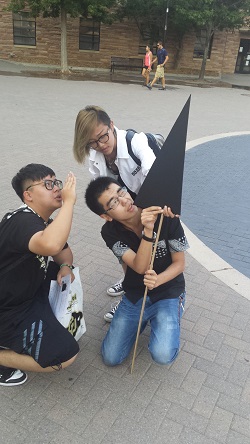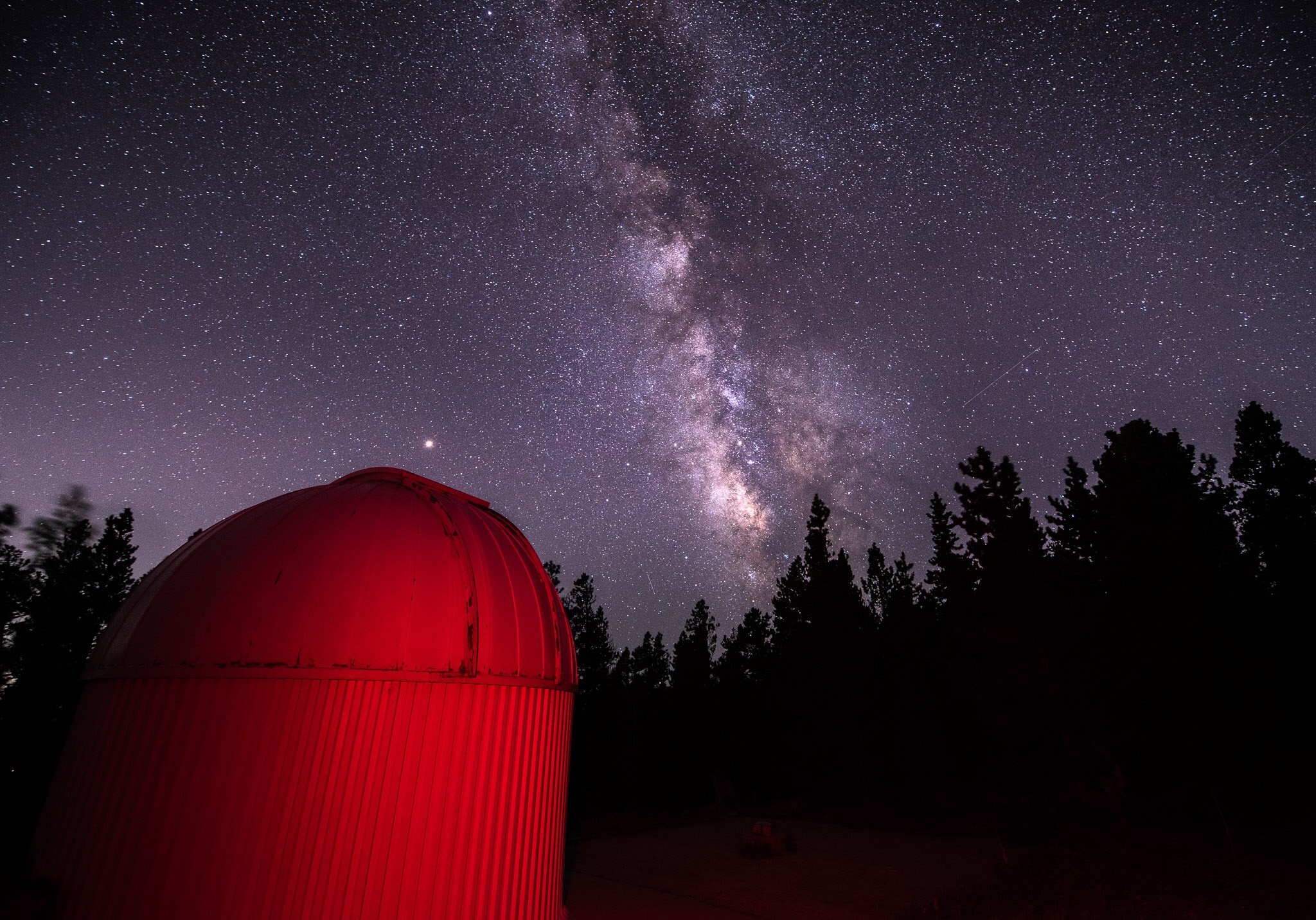COURSE: ASTR1020 Spring 2020 INSTRUCTOR: Douglas Duncan
COURSE TITLE: INTRODUCTORY ASTRONOMY: STARS AND GALAXIES
Lectures Tue. and Thurs. 12:30 – 1:45 in Duane G130 lecture hall. The First Day Power Point gives the flavor of this course! Full course materials may be downloaded as a zip file.
Learning Assistants (LAs): Allie C and Emily M The CU Learning Assistant Program has now been copied by nearly 100 universities. Weekly RECITATIONS with LAs: All recitations are held in the Sommers Bausch Observatory. (click for a map).
Expected behavior: Cell phones off – yours and mine! Courteous and attentive behavior is expected. During lecture you have 100% of my attention and I expect 100% of yours. The University’s expectations for student behavior in core science courses, including expected study hours and level of math are here. Those who violate the policies will be asked to leave class. Also, those who don’t text earn nearly half a grade higher than those who do!
WWW (Canvas) pages: The course home page may be reached at canvas.colorado.edu
Text The Cosmic Perspective, 9th Edition, by Bennett et al. You can get by with the 8th Edition IF you have or buy an online registration code for Mastering Astronomy and notice that chapter numbers have changed in some cases
Mastering Astronomy: This on-line homework and tutorial site is a required part of the course. Access to it comes with your textbook, after you register. It is at www.masteringastronomy.com. Click on “Getting Started” on the class home page in Canvas for registration instructions. Note that for late submissions credit goes down the later you submit. Also, you lose a tiny amount of credit when you use hints. If you read the chapter beforehand you do better on Mastering Astro!
Clickers: This course requires use of an iClicker. You should purchase this in the bookstore and bring it to every class. Conceptual clicker questions and peer discussion raise grades nearly half a grade!
Night Observing Sessions: The schedule will be posted on the class Canvas page.. They are held in the Sommers Bausch Observatory. (click for a map). You are to do one night observing session using the awesome new SBO telescopes.
NATURE OF THIS COURSE: ASTR 1020 is an introduction to astronomy of the universe beyond the solar system, including the origin, evolution, and eventual fate of the the sun, stars, galaxies, and the whole universe (cosmology) including the question of life in the universe. This class includes sky motions and study of the nature of science and pseudoscience – how to make good decisions in your own life when they involve scientific subjects. It is for non-science majors.
Be Warned! This course will be different from courses you have taken before! Please read the description carefully and decide if it’s for you. There will be less memorization and more creativity, thinking, and group discussion. My goal is to introduce you to some of the most awesome concepts known in science, and to give you some useful skills other classes may not teach, such as applying scientific thinking in your everyday life, for you own benefit.
If your previous science experience was mostly memorizing a lot of stuff – you’ve been cheated! The heart of science isn’t memorization. Science is questions more than answers, the unknown as much as the known, ways of thinking you can use in everyday life, and concepts that stretch your mind (like the warping of space and time near a black hole) rather than put it to sleep. “Science is a way of trying not to fool yourself,” and if all this appeals to you, check out this course. 
Notes; Exam Prep Sheets. Do I post notes? NO. Why? Because note-taking is a valuable skill to learn, and if done right it increases your learning and your grade. When you put explanations into your own words it helps you learn them. You will be allowed to bring a single double-sided sheet into each exam. On it can be anything you write. (not photo or computer copied).
Here are the course goals.
Here’s what I think science is.
My GRADING de-emphasizes exams, and replaces those points with class responses, homework, and teamwork. This should lesson your test anxiety, but it also means you can’t just work before finals and expect to do ok. If you skip class, it means losing part of your grade.
Here’s what students have said about my Introductory Astronomy course in the past. Notice that no one said that the class was easy. I don’t promise an easy course. I try for a memorable one.
So the good news is: you won’t have to memorize as much as in most science classes. The bad news is you can’t get a good grade just by memorizing stuff! You’ll have to be creative, and sometimes work hard to understand.…
This course will be taught in a way intended to foster dialogue and interaction. You will be given thought-provoking questions and usually I’ll encourage you to talk with your neighbors in lecture (on the right and left) before I ask for the answer. Discussions raise grades! We’ll discuss that in class.
What should you expect in this class? A little bit of math (but that is not the emphasis), a lot of practice solving problems on your own and working with others, and some physics – nothing complicated, roughly high school level, and everything will be explained. If you don’t quite remember an idea, you can re-learn it here.
This course will be fun! But if you hate working in groups or if you are thinking of skipping classes from time to time, it is definitely NOT for you. In that case, you should sign up for another astronomy class.
CONTENTS: (see the complete syllabus)
- Science, Pseudoscience, and “Trying not to fool yourself.”
- Short review of the sky and its motions
- How telescopes work
- How does the Sun work?
- How stars are born and how they die
- Neutron stars, black holes, and other exotic objects
- The content, structure, and motions of galaxies
- The origin, structure, and fate of the universe
- The possibility of life in the universe.
FIELD TRIPS: We hope to have an optional field trip by bus to CU’s “Mountain Research Station,” located about 45 min. from campus outside Nederland in the mountains. There the sky is really dark and incredible. You can see the Milky Way, thousands of stars, and even another galaxy, 2 million light years away. We’ll of course point out all those things. 
ANY QUESTIONS? SEND E-MAIL
Last modified Jan. 2020.
